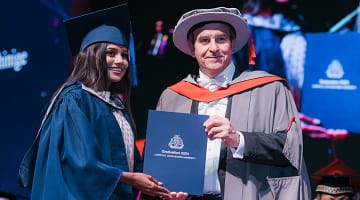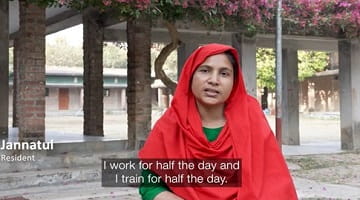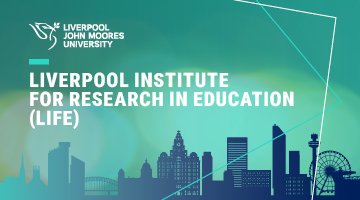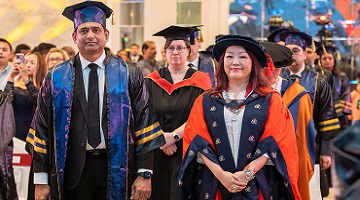About this course
The Doctorate in Business Administration (DBA) programme is one of the most established Professional Doctorates in the University. Delivered through blended learning, the DBA is cohort-driven and consists of four one-week residential workshops, monthly virtual action learning sets, and supervision via distance learning.
DBA candidates study part-time, and are likely to hold senior management positions allowing them to achieve the highest academic degree while remaining in full-time employment.
- Equivalent to a PhD, the DBA is ideal for those who would like a doctoral level qualification whilst remaining in their chosen professional career
- Focus on situational issues from your own workplace, whilst continuing your employment
- Enhance not only your ability to develop new knowledge, but also the ability to apply that knowledge to a professional context
- Gain the necessary skills to carry out rigorous research
- Carry out individual projects that impact on your organisation and industry
- Undertake your research amongst a carefully-selected, highly diverse group of professionals, drawn from a wide range of nationalities, industries, cultures and backgrounds
- Develop your skills and meet your supervisors at a number of residential workshops in Liverpool
Our strong cohort-focused ethos
You will develop a strong and engaging cohort identity by joining a group of like-minded senior professionals and apply your research directly to the needs of your business, driving forward organisational progress without putting your learning or your business on hold. You will contribute to commercial and academic knowledge and, on graduation, will possess a specialist range of problem solving and decision making strategies that will take you to the next level of success.
The DBA at Liverpool Business School is unique in its design and structure and the level of support it provides to the candidates. It has been running successfully for 14 years.
The programme will be of particular benefit to experienced business professionals. A DBA will enhance professional capability and credibility, enable you to develop networks, and provide a firm foundation for further career development or a major career move. Employers benefit from supporting candidates for the DBA by attracting, developing and retaining key talent and building knowledge for competitive advantage.
Liverpool Business School is a member of the Executive DBA Council (EDBAC) and, as such, we believe in fostering excellence and innovation in executive doctoral degree programmes.
Becoming a scholar-practitioner
Being a scholar-practitioner comes with the responsibility of being able to use scholarly research methods in order to make an impactful contribution to professional practice.
You will learn to simultaneously navigate both practitioner and academic worlds to develop strategies to understand a complex work-based problem. You will use your experience and expertise as a starting point, to enable you to engage with the academic body of knowledge to make sense of the intricacies of becoming a scholar-practitioner.
The DBA will enable you to develop a sound understanding of the relevant conceptual and theoretical underpinnings of your chosen are of research into business and management. By learning research techniques for advanced academic and management enquiry you will be able to carry out your own original research. In becoming a scholar-practitioner you will enhance your professional practice, as well as contribute to theory and practice in business and management.
In contrast to a PhD, a DBA requires a contribution to both theory and practice. Candidates on the DBA are therefore required to demonstrate that they make an impact on the development of a profession and/or an organisation.
This impact can be demonstrated within the organisation the candidate is employed in or in another organisation, including professional bodies or policy. This close link to industry and practice can be highly beneficial for the employer too, with many previous DBA research projects resulting in large financial savings for organisations that candidates implemented them in.
As part of the course, you will benefit from the following:
Workshops (Year 1-3 only)
- 4 residential workshops each 5 days long at Liverpool Business School
- Catering throughout the day
- Accommodation for 4 nights for each workshop
- Networking event during each workshop
Supervision
- Supervision throughout the duration of your doctoral studies by a qualified DBA supervisory team.
Other opportunities and events
- Global engagement and participation with our collaborative partner programme at SRH Berlin University of Applied Sciences, Germany
- Participation in the DBA Writing Retreats, both virtually and face-to-face
- Participation in the Faculty Doctoral Conference
- Participation in research methods training offered by NARTI (Northern Advanced Research Training Initiative)
- Access to thousands of academic journals and books including e-books
You also have access to the doctoral facilities at LBS whenever you decide to come to Liverpool.
Liverpool Business School at Liverpool John Moores University is a member of AACSB International The Association to Advance Collegiate Schools of Business.
AACSB International is a global association of leaders in education and business dedicated to supporting and advancing quality business education worldwide. Through membership, accreditation, research, thought leadership, professional development, and advocacy, AACSB partners with over 1,500 organizations, from more than 90 countries globally. Membership or participation in the Global Education Alliance does not imply accreditation.
Course modules
Discover the building blocks of your programme
Please note:
This course is currently undergoing its scheduled programme review, which may impact the advertised modules. Programme review is a standard part of the University’s approach to quality assurance and enhancement, enabling us to ensure that our courses remain up to date and maintain their high standard and relevancy.
Once the review is completed, this course website page will be updated to reflect any approved changes to the advertised course. These approved changes will also be communicated to those who apply for the course to ensure they wish to proceed with their application.
The design is based on two principles:
- Allow full-time professionals from all over the world to undertake doctoral studies part-time.
- Provide the full-time professionals with the necessary skills, knowledge, tools and techniques to undertake high quality research on a doctoral level and contributing to their professional practice.
Based on these two principles we've designed the following structure:
Year 1
Two residential workshops (taught elements), each 5 days long, will take place in Liverpool. These workshops focus on the planning process of the research, on refining the topic and basic research methods.
Year 2 and 3
One 5-day residential workshop will take place in Liverpool. These workshops focus on the execution of the research, i.e. data collection and analysis, but also on a dissemination and impact strategy, as well as academic writing, and viva preparation.
Year 4
Our experience shows that DBA candidates typically take four years to complete their thesis, whereas the maximum duration of the programme is seven years. After year 3 no further residential workshops take place; this is a time for independent study, writing up your thesis, and examination.
Further guidance on modules
Modules are designated core or optional in accordance with professional body requirements, as applicable, and LJMU’s Academic Framework Regulations. Whilst you are required to study core modules, optional modules provide you with an element of choice. Their availability may vary and will be subject to meeting minimum student numbers.
Where changes to modules are necessary these will be communicated as appropriate.
Core modules
Research Planning
60 credits
60 credits
To display a critical understanding of complex and specialised research knowledge and skills through the development of research proposals that demonstrate a) the potential for the creation of new knowledge at the forefront of their academic discipline or their area of professional practice b) the use of appropriate techniques/methodologies in their research.
Reflective Research Strategy
20 credits
20 credits
To plan how to critically reflect on personal, work-based, theoretical and research practice experiences that contribute to the creation of new knowledge.
Literature Review
60 credits
60 credits
To provide a critical understanding of existing knowledge and theory of a subject area relevant to your workplace, that can be applied to the creation of new knowledge at the forefront of their area of professional practice.
Research Methodology
60 credits
60 credits
To critically appraise research methodology, design and methods for their appropriateness to the area of enquiry.
Research Enquiry and Analysis
60 credits
60 credits
To collect and interpret qualitative and/or quantitative data that supports the creation and interpretation of new knowledge.
Final Thesis
60 credits
60 credits
To produce a final written thesis and communicate, discuss, and defend ideas clearly and concisely, to the satisfaction of peers.
Reflective Research Portfolio
40 credits
40 credits
To critically reflect on personal, work-based, theoretical and research practice experiences that contribute to the creation of new knowledge.
Your Learning Experience
An insight into teaching on your course
Study hours
During years one to three you will attend four residential workshops, each five days long, at Liverpool Business School.
Teaching methods
Our teaching ethos: learning together, and learning apart
The teaching and learning model of the DBA programme at LJMU is based around group activities where you will learn together as a student cohort, whilst having significant periods of independent study where you will learn apart. You will continuously engage with the development of both your practice and knowledge to become autonomous learners. This is a difficult task, so it is crucial that we provide suitable opportunities and support to enable such lifelong learning.
Residential workshops
Our residential workshops take place at our historic campus location in Liverpool City Centre. The experience really is like no other, and something that will stay with you for the rest of your life. You will be taken through an intensive and structured programme that pushes your learning journey forward and equip you will the skills and knowledge needed to successfully achieve your DBA. As well as providing interactive lectures and seminars from an expert academic team, you will have the opportunity to participate in research presentations, research cafes, social events, and high-profile industry guest speakers.
Asynchronous learning material
Through the utilisation of state-of-the-art learning technology, we provide virtual learning material in the form of video lectures, online activities and discussion forums, in an asynchronous format that perfectly complements a blended learning approach to your learning. You will regularly engage with the material in advance of the residential workshops, as well as using it as a valuable learning resource throughout your DBA journey.
Applied learning
Virtual Action Learning
Action learning is a key learning strategy on the DBA programme and very much aligns to the attributes of a scholar-practitioner. We adopt a novel action learning approach to enhance your ability to learn together and learn apart through the implementation of social and technical systems on a DBA programme.
There are four key elements to the approach to action learning; developing collaborative questioning between students, enhancing technology utilisation, fostering an environment of research-based inquiry and framing knowledge and skills through critical reflection. At the core is the development of collaborative questioning which enables you to come together as a cohort and develop questioning insight that will allow you to better investigate your work-based scenario.
Supervision
The supervision during doctoral studies is a key element of the experience. Our DBA candidates are supervised only by full-time academics employed at Liverpool Business School who are research active themselves and have a track record of publications and conference presentations.
The supervisory team is usually made up of two supervisors. If the circumstances require it a third supervisor can be added to the team. All our supervisors attend regular supervisor training workshops and are familiar with the most recent developments in supervising professional doctorate candidates.
If a DBA is undertaken within an organisation, an industrial advisor can be added to the supervisory team to represent the interests from practice. This is usually a manager or senior professional who is already an expert in the field of research.
How learning is monitored on your programme
To cater for the wide-ranging content of our courses and the varied learning preferences of our students, we offer a range of assessment methods on each programme.
Assessment techniques vary from module to module to reflect relevant assessment approaches and the key learning points of each topic.
There are various assessments throughout the programme.
During the first year students are required to submit the research proposal (approx. 5K words), learning agreement (approx. 3K words) and LJMU Ethical approval form. Year 2 and year 3, students will complete a series of modules that will culminate in a written thesis (approx. 80K words), complete a reflective portfolio and publish papers. The thesis can be submitted at the earliest after completion of year 3.
The assessment of the thesis takes place in form of an oral examination undertaken by two examiners, who are experts in your field. One examiner is from LJMU and one is external to the University.
Where you will study
The School is based in the Redmonds Building, in the heart of the bustling Mount Pleasant Campus and Liverpool's growing Knowledge Quarter. The building is home to high quality lecture theatres and seminar rooms, social spaces, and a café. It is only a short walk from LJMU's Aldham Robarts Library, which contains all the resources you will require for your studies.
Liverpool Business School also has a dedicated Management Development Suite, based in a listed building in the historic Georgian Quarter of Liverpool and a short walk from the Redmonds Building. The building has recently undergone £1.2 million investment to provide a professional learning space.
Course tutors

Dr Hannah Wilson
Programme Leader
The DBA is an excellent opportunity for executives and professionals to develop their skills and to gain a doctoral qualification. I really enjoy seeing the candidates develop during their doctoral journey. It is very satisfying to see how their world view changes and how they become more critical reflective scholarly practitioners. I am very passionate about this and want to support them in the best possible way.
The DBA is an excellent opportunity for executives and professionals to develop their skills and to gain a doctoral qualification. I really enjoy seeing the candidates develop during their doctoral journey. It is very satisfying to see how their world view changes and how they become more critical reflective scholarly practitioners. I am very passionate about this and want to support them in the best possible way.
Hannah is responsible for the design, delivery and development of the DBA programme.
-
 Lecturer/Senior Lecturer
Lecturer/Senior Lecturer
Career paths
Further your career prospects
LJMU has an excellent employability record with 96% (HESA 2018) of our postgraduates in work or further study six months after graduation. Our applied learning techniques and strong industry connections ensure our students are fully prepared for the workplace on graduation and understand how to apply their knowledge in a real world context.
If you are employed during the course of your DBA, you will probably undertake research which directly links to your employer's area of business. This will be of great benefit to you and your employer, particularly if you are focused on a large-scale project.
Previous students have found that the research undertaken during their DBA has helped them gain valuable and objective feedback which has essentially provided their employers with high levels of focused, internal consultancy.
Tuition fees and funding
- Part-time per year:
- £13,020
- Writing up:
- £4,600
Fees
The fees quoted above cover registration, tuition, supervision, assessment and examinations as well as library membership and student IT support with access to printed, multimedia and digital resources including programme-appropriate software and on campus wifi.
Financial Support
There are many ways to fund postgraduate study for home and international students. From loans to International Scholarships and subject-specific funding, you’ll find all of the information you need on our specialist postgraduate funding pages. The University offers a range of financial support for students. You'll find all the information you need on our specialist financial support pages including details of the Student Support Fund and other activities to support with the cost of living.
Additional Costs
In addition to fees, students should also keep in mind the cost of:
- Accommodation
- Travel costs and field trips unless paid for by LJMU
- Stationery, IT equipment, professional body membership and graduation gown hire
If you need advice about how to pay your tuition fees, please email LJMU's Student Funding Team.
Tuition fees
All students enrolled on postgraduate taught programmes at LJMU are liable to pay an annual tuition fee. You can opt to pay your tuition fees in full at the start of each academic year or in instalments.
LJMU Alumni Award
If you're a former Liverpool John Moores University student, you could be eligible for a 20% discount on your postgraduate tuition fees. The fee reduction will apply automatically to eligible students. You'll find all of the information you need on our specialist postgraduate funding pages.
Entry requirements
You will need:
Qualification requirements
Postgraduate degree (required for research programmes)
- A master's degree in the area of business and/or management
Additional requirements
-
Relevant work experience
- At least two years of managerial or five years of other working experience
Further information
-
Extra Requirements
In order to make an application to the programme you need to provide the following documents via the online application:
- Curriculum vitae
- Master's certificate and transcript in the area of business and/or management – these must be official English translations
- Evidence of at least two years of managerial or five years of other working experience – this can be e.g. a confirmation by your current employer or a reference letter from a former employer
- An academic reference, which recommends you for the programme – this can be e.g. from your master's institution
- An industry reference, which recommends you for the programme – this can be e.g. from your employer, from a client and/or professional body
- Personal statement (max. 2,000 words) – this is not a full research proposal, but should address why you would like to do a DBA, why you think you are suitable for the programme and what you expect from the DBA. You should furthermore provide a brief outline of your research topic and its contribution to theory and practice, including:
- title of your research
- introduction of your research
- literature review of current studies
- research methods
- contribution of your research.
How your application is considered:
- The application is screened to ensure the candidate meets the entry requirements and has submitted all their supporting documents.
- If the candidate meets the minimum entry requirements and all documents have been received, the application is passed to the appropriate academics within the School for consideration and to identify a suitable supervisory team.
- The DBA Team and/or an appropriate academic member of staff will interview the applicant and make a decision following the interview. For applicants in the UK, they are invited to attend the interview in person at Liverpool Business School. For applicants based elsewhere, the interview will normally take place by telephone, Skype or Adobe Connect.
How to apply
Securing your place at LJMU
To apply for this programme, you are required to complete an LJMU online application form. You will need to provide details of previous qualifications and a personal statement outlining why you wish to study this programme.
When submitting your online application form, you must also provide the following documents:
- Masters degree certificate
- Transcript of Masters study
- An academic reference
- A reference from your current employer
A personal statement (1500-2000 words) to include:
- Reasons why you want to study on the DBA course
- Reasons why you are suitable for the course
- Details of your previous research experience and a brief introduction to your research including the title, a literature review of current studies, research methods and the contribution made by your research
Should you have any queries regarding the entry criteria or documents required, please contact the Faculty Admissions Office.
Your university life
From accommodation and academic support to clubs and societies. Find out what LJMU has to offer.
Related Links
Talk to our students
Connect with a current LJMU student for advice and guidance on university life, courses and more.
See what our students are saying
At LJMU we want you to know you’re making the right choice by studying with us. You can see what our students are saying about their experience with us through their reviews on the following websites:
Related Links
News and views
Browse through the latest news and stories from the university










The University reserves the right to withdraw or make alterations to a course and facilities if necessary; this may be because such changes are deemed to be beneficial to students, are minor in nature and unlikely to impact negatively upon students or become necessary due to circumstances beyond the control of the University. Where this does happen, the University operates a policy of consultation, advice and support to all enrolled students affected by the proposed change to their course or module.



















